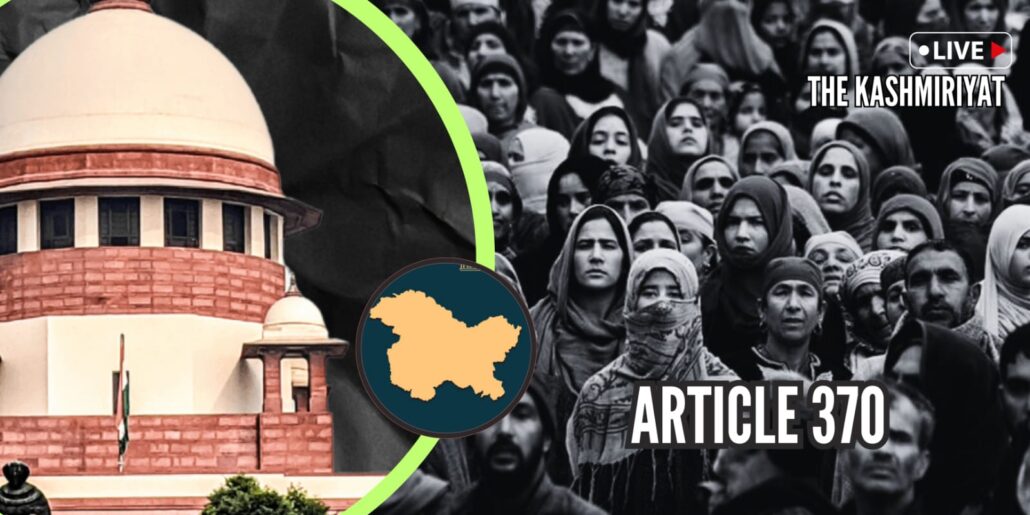
On Wednesday, the Supreme Court of India is likely to hear the arguments of the Government lawyers on petitions challenging article 370.
The Constitution Bench comprising CJI DY Chandrachud, Justice Sanjay Kishan Kaul, Justice Sanjiv Khanna, Justice BR Gavai, and Justice Surya Kant will resume hearing on day 9 from 10:30 am today.
The counsels appearing on behalf of the petitioners are set to conclude arguments in the pre lunch session today.
On Tuesday, the court rejected the submission that Article 370 of the Constitution ceased to operate once the term of the constituent assembly of Jammu Kashmir ended in 1957 after drafting its Constitution.
Pertinently, the central Government on 5 August, 2019 ripped Jammu Kashmir of its special status by abrogating the Articles 35a and 370.
Live Updates
Senior Advocate Nitya Ramakrishnan representing the People’s Democratic party starts argument.
The spoken or unspoken assumption is that Art 370 is temporary, lying for a greater integration. I’m saying that the view is fallacious.
11: 02 A.M: This shared sovereignty is really a system of checks and balances. Article 370 reflects that- central power and power of the State of J&K, argues Adv. Nitya.
11:04 AM: 56 out of the 87 MLAs were ready to form the Government. What business does the Governor have to say I am not there?
11:06 A.M: Adv. Nitya: The Governor came on a public TV channel and said he too had no idea what was happening. How was it a will of people when the Guv. publicly said that he also did not know?
11:10 A.M: Even if J&K flows with milk and honey, the argument that in order to secure the people their rights we have to destroy their statehood- that cannot be justified, argues Adv. Nitya. She concludes, “I visited Kashmir in 2019, not that people were not being stopped from visiting Kashmir, but Kashmiris have great reverence for Gandhi.”
11: 21 A.M: Senior Advocate Menaka Guruswamy begins her arguments.
“India’s first prime minister in a speech in Hindi said that we’re a nation whose land of this nation is strewn with blood…that is our constitutional founding,” Adv. Menaka.
11: 30 A.M: It was envisaged by our founders for the State of J-K integrated with Union of India. It’s not just Art 1 and 370 which is part of that constitutional intention. It’s much more than that. It’s the specific Provisions of J&K Constitution – Sections 4 and 5.
11:35 A.M: Jammu Kashmir has a unique assembly. It has reservation for religious minorities in its legislative including that for Sikhs. Ladakh has no legislative representation. Ladakh had 4 MLAs and two MLCs.
11:40 A.M: The abrogation has cut into everything. Senior Advocate Guruswamy concludes her arguments.
11:50 AM: Advocate Manish Tiwari starts his arguments. The Abrogation of Article 370 may have repercussions on Article 371 that provides special provisions to North East.
Solicitor General of India intervenes, “I have been instructed to say the centre has no intention to touch the special provisions provided under Article 371.”
2:05 P.M: The bench gathers for post lunch session.
Adv. Gopal Shankarnarayanan begins argument: There is a little bit of history and a previous attempt in the Parliament to omit Art 370. There were debates on this Gulzari Lal Nanda, who was the home minister between his two tenures as interim PM, he said that there is no way we can repeal Article 370.
2:30 P.M: Adv. Gopal continues: Sheikh Abdullah and GoI (Indira-Sheikh accord 1975) entered into an agreement in 1975 and that agreement provided for the fact that Article 370 will not be touched and in return Sheikh Abdullah would not seek secession from India.
2:45 P.M: They used Article 3 to convert the state into a UT. they did not follow any procedure, argues Gopal Shankarnarayanan.




